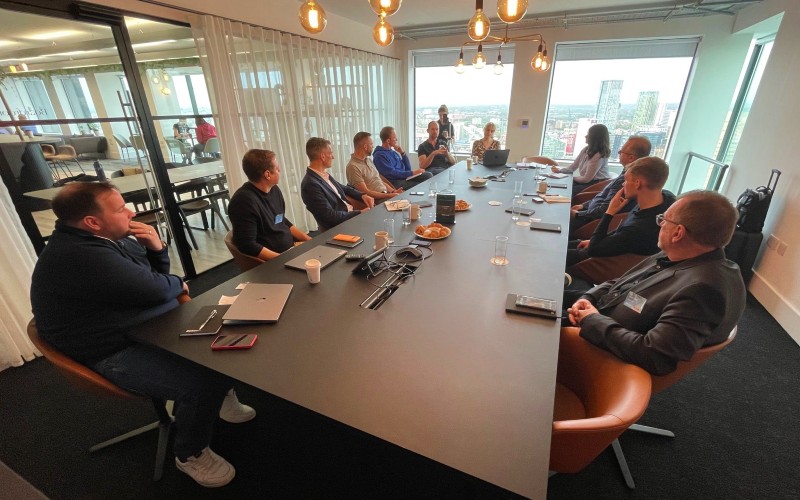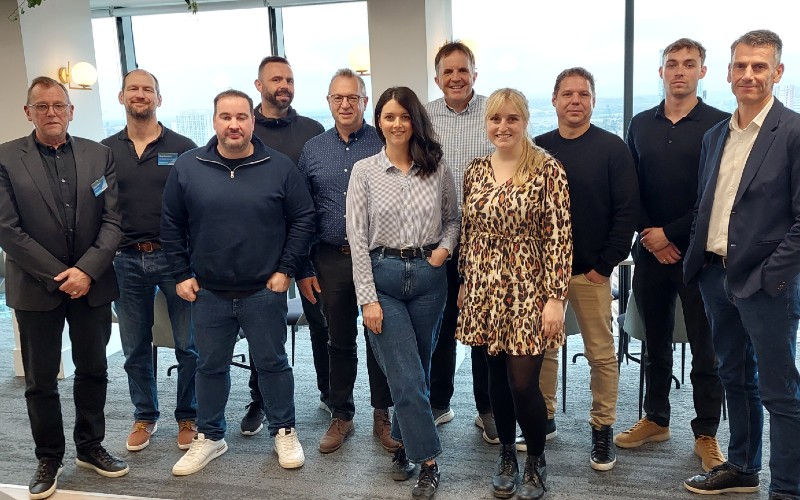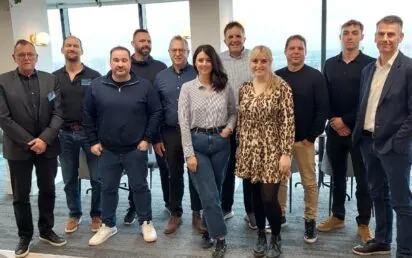The internet fundamentally changed retail forever, with almost any product now able to be delivered to your doorstep with the click of a button.
Now another potentially massive shift is coming with the rise of artificial intelligence.
But is the increasing prominence of large language models such as ChatGPT more of a help or a hindrance to retailers? How are they utilising this and other forms of AI in their quest to drive sales and better serve their customers? And where should the human touch be retained?
We joined forces with public relations company Refresh PR for a roundtable in the 28th floor Sky Lounge boardroom in City Tower, Manchester to discuss the impact of AI on retail.
AI on the cards
André Brown is CEO of Advanced Commerce, which placed fifth on our RetailTech 50 ranking this year.
The London firm’s GrapheneHC platform combines three technologies – site search, visual merchandising and product recommendations – to help clients deliver a better online shopping experience on their websites, increasing sales and reducing drop-off rates.
Brown, who previously founded and floated high-profile merchandising platform Attraqt, produced a deck of cards to make his point. “If you all visited the same website, and these cards represented the products on that site, should you all be shown them in the same sequence?” he asked, peeling them off one by one.
“The same customer profile is being applied to everyone, [which makes no sense].”
After the joker made its planned appearance in the sequence, he further illustrated his point. “As you segment your customer base, you’ve got people with different preferences for, say, brand, colour and price. There’s a lot of focus right now on trying to make sure that you’re showing an appropriate product sequence to each customer.
“But there’s also an inherent conflict between AI and human merchandisers: AI is data-driven personalisation, whereas if you’re a merchandiser, your role is to promote the brand’s DNA on the website – and the way you do that is through the way you curate pages.
“We’re doing a lot of work at the moment about how you can blend the two together.”
Strategy-first
Dropit – 13th on the RetailTech 50 and also based in London – supplies an AI plugin which operates as a ‘brain’ to unify and direct the expansive tech stacks used by retailers, enabling them to map operational paths and outcomes.
COO Stuart Ford says “retailers are grasping on to AI enthusiastically” but warns that they must do so in a cohesive way.
“Often, they are using it to try and optimise an inaccurate business strategy,” he explained. “They’re trying to make what they’re doing better, without looking at what it is that they’re actually doing.
“AI does not solve strategy issues. You have to start with the right strategy and then use the data correctly to help you optimise that.”

Adam Ward’s Airtime Rewards app works with around 250 retailers across the UK, both in-store and online, to reward shoppers with mobile credit or data. Featured on our MarTech 50 ranking, the Manchester company has three and a half million active monthly users and turned over around £30 million this year.
“Retailers are using companies like ourselves to understand a lot more about their customers,” he said. “Specifically, what we do for brands is allow them to communicate offers and target customers that they want to bring through the door, and influence them to come and spend with them.
“A lot of the retailers we talk to, from a marketing perspective, aren’t using AI a great deal. And that’s where our opportunity is.”
Maxed out
Dream Agility, another firm to feature on the MarTech 50, is a specialist in lead generation and paid search based in Ramsbottom, Lancashire.
Co-founder Glyn Powditch says “CEOs are looking to do something in AI, but they’re not really sure what”.
“They need to be looking at the real business problems they have then consider how AI is causing them – in some instances – as well as how AI providers can resolve them.”
He offers the example of Performance Max, introduced by Google as a goal-based campaign type claiming to allow advertisers to increase conversions across Search, Display, Discover, Maps, Gmail and YouTube.
“There’s been a lot of cases where AI is being imposed on people, and they’re not even really that aware of it. Performance Max has been essentially driving a lot of issues in businesses: with the best of intentions, you’ve got record levels of return rates, record levels of cancellations, and fraud – all driven by the fact that those feedback loops are not being connected back to the original ads.
“Effectively Google is marking its own homework, saying ‘we’re selling lots and lots of stuff, here’s a brilliant return on ad spend’ – but the commercial teams within these businesses are looking at it and saying, ‘we have record return rates and record fraud’.
“Marketing looks great, but the other departments don’t.”
So much Chat
So what is the impact being generated by large language models such as OpenAI’s ChatGPT?
Ben Hookway is CEO of Lancaster-based Relative Insight, another MarTech 50 star which provides language analysis to help retail brands connect with customers.
“Retailers are applying AI to the customer experience – improving interactions and loyalty, and decreasing cost. That splits into two things,” he says. “One is to use AI and analytics to understand what to do; and then to use generative AI to implement that at massive scale and lower cost.
“They are also transforming hazy data – review data, review text, customer interaction – into actionable metrics that can be applied at scale. This will open up a whole new area of business intelligence to senior decision-makers.
“We think there’s going to be a slight retrenchment in the next few months as corporations start to realise that they want to understand the data they have rather than use open generative AI tools. When they do that, and have their own private generative AI LLMs, then the amount of innovation is going to be breath-taking.”
Shopblocks, an eCommerce platform that enables companies to set up an online store in a fraction of the time it takes to build a traditional website, has just raised more than £1.5m to become established as a leader in the B2B market.
Stewart Reynolds, chief commercial officer at the Manchester company – seventh on the RetailTech 50 – outlines the traditional process for predicting sales. “You’d get maybe two heads of departments together, review the data and perhaps ask a computer programmer to create a model that was repeatable. But it would take a lot of work and effort,” he explained.
“Now, you can plug that data into something like GPT and ask it to provide those trends – you can achieve a lot more with less resource.”
Among our sister website TechBlast’s recent Manchester Startups 2.0 list of companies yet to receive venture capital funding was Fassion, a ‘shopping-first social marketplace’ for independent fashion.
CEO Billy Butt said even enterprise companies can fall into the trap of entrusting their content generation to the likes of ChatGPT.
“When it comes to descriptions and merchandising, I don’t think they know how they’re going to use that currently,” he said. “Those that are using ChatGPT for merchandising won’t do so for long – it’s so impersonal and cheesy that it’s going to become obvious when something hasn’t been written by a human.
“I think we’ll see a fundamental change within the next six months as to how people utilise these models and how corporations monitor their use by staff in a business.”
Game-changer
Michael Ashworth is eCommerce sales director at CTI Digital, a development agency for ‘ambitious retailers’.
“Merchants have already been forced to embrace AI, whether they like it or not,” he said. “The average merchant’s tech stack already contains a number of systems, such as merchandising and marketing automation, and they have AI built into them.
“Many are still confused as to what it means for them, and how to get good returns from that. It’s still quite immature.
“But I think it’s going to be a game-changer – probably as big as when the internet first came along in terms of how we shop and how we interact with customers.”
Lucy Moore (below) is associate director at boutique agency Refresh PR and has a focus on technology.
“I would echo what everybody else has said around the opportunities for personalisation and optimisation,” she told the roundtable.
“But it’s important to recognise why you need these technologies: in the messaging around your business, you have to communicate what problems and challenges it actually solves, rather than the tech being the focus.
“It’s about recognising the ‘why’ rather than getting excited and trying to shoehorn every single technology into your retail business.”
Building a crisis comms strategy: proactivity wins over reactivity every time


